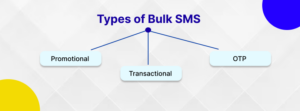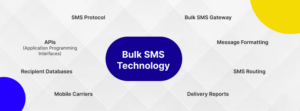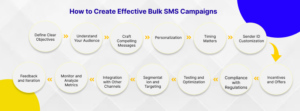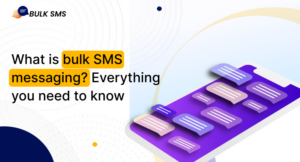What is Bulk SMS
Imagine you want to send a message to a group of people. Instead of typing and sending that message individually to each person, which would take a lot of time, you use a service that allows you to send the same message to many people at once. That’s essentially what bulk SMS messaging is.
Bulk SMS, or bulk text messaging, is a way of sending a large number of messages to a group of recipients at the same time. It’s like broadcasting a message to multiple people instantly. This is commonly used by businesses, organizations, and even individuals for things like announcements, promotions, reminders, or any situation where you need to communicate the same information to many people simultaneously. It’s a quick and efficient way to reach a large audience via text messages.
Get a free consultation with our Bulk SMS experts to understand how Bulk SMS Messaging can elevate your business communication
Importance and relevance of Bulk SMS in today’s digital communication landscape
Bulk SMS holds significant importance in today’s digital communication landscape due to its ability to provide instant and direct reach to a large audience. With high open rates and cost-effectiveness, it offers businesses and organizations an efficient way to convey time-sensitive information, promotions, OTPs and updates.
The bulk SMS messaging can be categorized majorly into 3 categories, being Transactional Messages, Promotional Messages, and OTPs.

These serve different purposes and are subject to different regulations. Here’s a brief overview of each:
Transactional Messages
Purpose: These messages are typically used to convey important information or updates related to a user’s account or transaction. Examples include order confirmations, shipping notifications, account alerts, and appointment reminders.
Characteristics:
- Usually sent to individuals who have an existing business relationship with the sender.
- They provide essential and time-sensitive information.
- Regulatory bodies often treat transactional messages with less stringent opt-in requirements compared to promotional messages.
- These messages are generally expected and appreciated by the recipients.
Promotional Messages
Purpose: Promotional messages are meant for marketing and promotional activities. They are used to advertise products, services, or events to a wide audience.
Characteristics:
- Typically sent to a larger audience, including individuals who may not have a prior relationship with the sender.
- The content is focused on promoting products, discounts, sales, or events.
- In many regions, sending promotional messages may require explicit opt-in consent from the recipients.
- There are often more restrictions on the timing of promotional messages, such as not sending them during certain hours.
One-Time Passwords (OTPs)
Purpose: OTPs are used for authentication and security purposes. They provide a temporary code that users must enter to verify their identity during a login or transaction.
Characteristics:
- Time-sensitive and valid for a short duration.
- Critical for enhancing the security of online transactions and account access.
- Generally sent to individuals for whom secure authentication is crucial.
- The content of OTP messages is predefined and strictly focused on delivering the temporary code.
Read more about the Major Types of Bulk SMS and How They Work
The personalization and targeting features make it a versatile tool across various industries, contributing to customer engagement and relationship-building. In a mobile-centric society, where people are almost always connected to their smartphones, bulk SMS capitalizes on this behaviour, ensuring that messages are delivered promptly. Additionally, its compliance with regulatory standards adds a layer of trust, making bulk SMS a valuable component in a comprehensive multi-channel communication strategy.
Brief history of bulk SMS messaging
The history of bulk SMS messaging traces back to the early days of mobile communication. In the late 1990s and early 2000s, as mobile phones became more widespread and text messaging gained popularity, businesses and service providers started exploring ways to use SMS as a communication tool. The concept of bulk SMS emerged as a solution to efficiently reach a large audience with a single message.
The first applications of bulk SMS were primarily in the areas of marketing and customer communication. Businesses realized the potential of sending promotions, alerts, OTPs, and information to a wide customer base through text messages. As technology advanced, specialized SMS gateways and platforms were developed to facilitate the sending of bulk SMS. These platforms streamlined the process, allowing businesses to send messages to thousands or even millions of recipients simultaneously.
The increasing reliance on mobile phones for communication and the growth of mobile marketing contributed to the expansion of bulk SMS services. Over the years, innovations in messaging technology and the rise of smartphones further enhanced the capabilities and reach of bulk SMS messaging.
Today, bulk SMS is an integral part of the communication strategy for businesses, organizations, and individuals worldwide. It has evolved into a versatile tool with features like personalization, analytics, and integration with other communication channels, making it a powerful means of engaging with audiences on a large scale. The history of bulk SMS reflects its evolution from a simple text messaging tool to a sophisticated communication method with broad applications across various industries.
How Bulk SMS Works
Let’s dive into how bulk SMS works in a way that’s easy to understand.
Imagine your business needs to communicate with a large number of customers or clients all at once. You’ve got a message to share—maybe it’s a flash sale announcement, a new product launch, or even important updates. Instead of manually reaching out to each person, which is time-consuming and not practical on a larger scale, you turn to bulk SMS. Read in-depth about how Bulk SMS Service works.
In essence, bulk SMS is a business tool that streamlines your communication efforts. It allows you to efficiently reach a large audience, ensuring your important messages are delivered instantly and directly to your customers or clients’ mobile devices. It’s a time-saving and effective way for businesses to keep their audience informed and engaged.
Connect with our experts for a personalized, no-obligation consultation.
Overview of the technology behind bulk SMS

Let’s delve into the technology behind bulk SMS messaging in a simplified manner.
- SMS Protocol: At its core, Short Message Service (SMS) is a protocol used for sending text messages between mobile devices. It’s a universal standard, making it compatible across various devices and networks.
- Bulk SMS Gateway: The magic starts with a Bulk SMS Gateway, a specialized platform that acts as a bridge between your business and the mobile carriers. It’s like a digital post office that handles the distribution of your messages.
- APIs (Application Programming Interfaces): Many businesses interact with the Bulk SMS Gateway using APIs. APIs are like sets of rules that allow different software systems to communicate with each other. Your business applications can talk to the Bulk SMS Gateway using these APIs to send messages.
- Message Formatting: When you send a message, the content needs to be formatted correctly. This includes the actual text of your message, the recipient’s phone number, and any other relevant information. This formatting ensures that the message is readable and delivered accurately.
- Recipient Databases: Businesses usually maintain databases of customer or client contacts. The Bulk SMS platform interfaces with these databases, allowing you to upload and manage your list of recipients.
- SMS Routing: Once your message is ready, the Bulk SMS Gateway determines the most efficient route to deliver the message. This involves choosing the right mobile carrier or network to ensure optimal delivery speed and reliability.
- Mobile Carriers: The message travels through various mobile carriers. These carriers are essentially the network providers (like Airtel, Vi, etc.) that handle the delivery of messages to mobile devices.
- Delivery Reports: As the message is sent, the Bulk SMS Gateway often generates delivery reports. These reports provide insights into whether the message was successfully delivered, if there were any issues, and sometimes even whether the recipient opened the message.
The technology behind bulk SMS involves a sophisticated interplay with the aim of ensuring that the messages are delivered accurately, efficiently, and in a way that allows for tracking and interaction when needed.
Role of SMS gateways and providers
The role of SMS gateways and providers is crucial when businesses use bulk SMS. Here’s a breakdown:
SMS Gateways
- Communication Intermediaries: SMS gateways act as intermediaries between businesses and mobile carriers. They facilitate the transfer of messages from the sender (business) to the recipients through the mobile carriers’ networks.
- Routing Experts: SMS gateways are like intelligent traffic directors. They determine the most efficient route for delivering messages, ensuring that they reach recipients quickly and reliably.
- Format Transformers: SMS gateways handle the formatting of messages, ensuring they comply with SMS standards. This includes converting the message into a readable format for delivery to mobile devices.
Bulk SMS Providers
- Platform Facilitators: Bulk SMS providers offer platforms or services that enable businesses to send large volumes of messages efficiently. They often provide user-friendly interfaces or APIs for businesses to manage and send messages.
- Recipient Management: Providers help businesses manage recipient lists, allowing them to upload, organize, and maintain contact databases. This is essential for targeting specific audiences.
- Delivery Optimization: Bulk SMS providers optimize message delivery by coordinating with SMS gateways and selecting the best routes to ensure messages reach recipients promptly.
- Analytics and Reporting: Many providers offer analytics tools and delivery reports. This feedback loop allows businesses to track the success of their campaigns, providing insights into message delivery and recipient engagement.
Benefits of Bulk SMS Messaging for businesses

The benefits of using bulk SMS for businesses are diverse and impactful:
- Instant Communication: Bulk SMS allows businesses to communicate with a large audience instantly. Messages are delivered within seconds, ensuring that time-sensitive information reaches recipients promptly.
- High Open Rates: Compared to emails or other forms of communication, text messages have exceptionally high open rates. People tend to check their text messages promptly, increasing the likelihood that your message will be seen.
- Cost-Effectiveness: Bulk SMS is a cost-effective communication channel. It eliminates the need for printed materials, postage, or advertising space, making it an affordable option for businesses of all sizes.
- Direct and Personalized Messaging: Businesses can send personalized messages directly to individuals or specific groups. This personalization enhances the relevance of the message, fostering a stronger connection with the audience.
- Increased Engagement: Bulk SMS is an effective tool for engaging customers. Whether it’s promotional offers, event invitations, or updates, the direct and concise nature of SMS encourages engagement and action.
- Targeted Marketing: Businesses can target specific demographics or customer segments with tailored messages. This targeted approach ensures that messages are relevant to the recipients, increasing the chances of a positive response.
- Time-Sensitive Offers and Reminders: Businesses can use bulk SMS to send time-sensitive offers, flash sale notifications, or appointment reminders. This real-time communication is valuable for driving immediate action.
- Ease of Use: Sending bulk SMS is a straightforward process. With user-friendly platforms and APIs provided by SMS service providers, businesses can easily manage and execute their SMS campaigns.
- Integration with Other Channels: Bulk SMS can be integrated with other marketing channels, creating a cohesive and multi-channel communication strategy. It complements email marketing, social media, and other channels for a comprehensive outreach.
- Customer Relationship Management: Bulk SMS is an effective tool for building and maintaining customer relationships. It allows businesses to keep customers informed, gather feedback, and provide excellent customer service.
- Real-Time Analytics: Many bulk SMS platforms provide real-time analytics and delivery reports. Businesses can track the performance of their campaigns, measure engagement, and make data-driven decisions for future messaging strategies.
Considering the integration of Bulk SMS Messaging in your Business? Book a free consultation with our Bulk SMS Experts.
Industry wise Bulk SMS Use Cases
FinTech Bulk SMS use casesTransaction Management:
Security and Authentication:
Promotional Communication:
Financial Notifications:
Customer Interaction and Support:
|
EdTech Bulk SMS use casesAcademic Communication:
Institutional Information:
Feedback and Evaluation:
Event Promotion and Participation:
Logistical Notifications:
|
Healthcare Bulk SMS use casesAppointment Management:
Medication and Test Reminders:
Health Communication and Education:
Patient Engagement and Feedback:
|
Retail Bulk SMS use casesPromotional Outreach:
Customer Engagement:
Customer Re-engagement:
|
BFSI Bulk SMS use casesTransaction and Account Management:
Security and Authentication:
Promotional Offers:
|
E-commerce & D2C Bulk SMS use casesOrder Management:
Promotions and Discounts:
Customer Support and Assistance:
Feedback and Reviews:
|
What is a Bulk SMS Platform?
A Bulk SMS Platform is a specialized software or service that enables businesses and organizations to send large volumes of SMS (Short Message Service) messages to a predefined group of recipients. These platforms streamline the process of managing, scheduling, and sending mass text messages, providing a centralized and efficient solution for businesses looking to engage with their audience via SMS.
Imagine a Bulk SMS Platform as your go-to tool for sending lots of text messages to a bunch of people all at once. It’s like a helpful assistant that simplifies the whole process. You log in, create your message (maybe a promotion, an update, or just a friendly reminder), and tell the platform who you want to send it to. Need to personalize the message? No problem, you can do that too. The platform makes sure your message is sent out smoothly, and you even get to see if people are reading it with handy reports.
Key Features of Bulk SMS Platforms
Bulk SMS platforms come with a range of features designed to streamline the process of sending mass messages, ensuring effective communication. Here are key features commonly found in bulk SMS platforms:

- User-Friendly Interface: Intuitive dashboards and user interfaces make it easy for businesses to navigate the platform, manage contacts, and send messages.
- Contact Management: Efficient tools for managing contact lists, including options for importing, organizing, and updating contact information.
- Message Personalization: Customization options that allow businesses to personalize messages with recipient names or other dynamic content, enhancing engagement.
- Sender ID Customization: The ability to customize the sender ID, ensuring that recipients see a recognizable and branded name as the sender of the message.
- Scheduling Options: Features for scheduling messages to be sent at specific dates and times, enabling businesses to optimize message delivery.
- Delivery Reports and Analytics: Comprehensive reports on message delivery status, open rates, and other analytics to assess the success of SMS campaigns.
- Template Management: Template libraries that enable businesses to create and store message templates for quick and consistent communication.
- API Integration: Application Programming Interface (API) integration that enables businesses to connect the bulk SMS platform with other applications and systems for seamless workflows.
- DND (Do Not Disturb) Compliance: Compliance features to ensure adherence to Do Not Disturb regulations, helping businesses avoid sending messages to recipients who have opted out.
- International SMS Support: The capability to send messages internationally, supporting businesses with a global audience.
- Unicode and Multi-Language Support: Support for Unicode characters and multiple languages, accommodating diverse audiences and facilitating multilingual communication.
- Security Measures: Robust security features to protect sensitive customer data and ensure the secure transmission of messages.
- Scalability: Scalable infrastructure that can handle large volumes of messages, catering to the needs of businesses with growing or fluctuating messaging requirements.
- Automated Responses: Automated response capabilities that enable businesses to set up automatic replies based on specific triggers or keywords.
- Surveys and Polls: Features for conducting surveys or polls via SMS, engaging recipients and gathering feedback.
- Campaign Management: Tools for planning, executing, and managing SMS marketing campaigns, including the ability to set goals and track campaign performance.
- Integrations with CRM Systems: Integration options with Customer Relationship Management (CRM) systems, facilitating the seamless flow of customer data between platforms.
- Customer Support: Access to responsive customer support services to assist businesses in resolving issues and optimizing platform usage.
These key features collectively contribute to the effectiveness and efficiency of bulk SMS platforms, making them valuable tools for businesses across various industries. Businesses should select platforms that align with their specific needs and provide the features necessary for successful SMS communication.
Bulk SMS Regulations and Compliance in India
In India, bulk SMS messaging is regulated by the Telecom Regulatory Authority of India (TRAI). TRAI has established guidelines to govern the use of SMS for commercial purposes, aiming to protect consumers from unsolicited messages and maintain the integrity of communication services. Here’s an overview of key regulations:
Importance of compliance in bulk SMS messaging
Legal Consequences
Non-compliance with regulations can lead to severe legal consequences, including fines and legal actions. Businesses engaging in unsolicited or spam SMS messaging may face penalties from regulatory authorities.
Reputation Management
Compliance is essential for maintaining a positive brand reputation. Customers appreciate businesses that respect their privacy and adhere to regulations. Engaging in ethical and compliant SMS practices helps build trust and credibility with the audience.
Best Practices to Ensure Compliance:

- Permission-Based Marketing: Obtain explicit consent from recipients before sending SMS messages. Implementing an opt-in system ensures that messages are sent to individuals who have willingly subscribed to receive them..
- Data Security Measures: Implement robust data security measures to protect customer information. This is particularly important in regions with strict data protection laws, such as the GDPR in the European Union.
- Stay Informed and Updated: Regularly monitor and stay informed about changes in regulations. SMS marketing regulations may evolve, and businesses need to adapt their practices accordingly to remain compliant.
- Transparency in Messaging: Clearly identify the sender and provide concise information about the purpose of the message. Transparent communication helps build trust and ensures that recipients understand why they are receiving the SMS.
Compliance with regulations is paramount in bulk SMS messaging. It not only safeguards businesses from legal consequences but also plays a crucial role in maintaining a positive brand image and fostering trust with customers.
Implementing best practices, such as permission-based marketing, providing opt-out options, ensuring data security, staying informed, and maintaining transparency, are essential steps to ensure compliance in the dynamic landscape of bulk SMS messaging.
Choosing a Bulk SMS Service Provider
Choosing the right bulk SMS service provider is crucial for the success of your SMS campaigns. Here are key factors to consider and insights into pricing models:
Factors to Consider When Selecting a Provider:
- Compliance and Regulations: Ensure the provider complies with local and international regulations, such as GDPR or the regulations set by telecom authorities. This includes adherence to Do Not Disturb (DND) rules and data protection laws.
- Delivery Rates and Speed: Evaluate the provider’s historical delivery rates and delivery speed. A reliable provider should have high delivery rates and ensure that messages are delivered promptly.
- Sender ID Customization: Check if the provider allows customization of the sender ID. This feature is essential for branding and building trust with recipients.
- User Interface and Ease of Use: Look for a user-friendly interface that simplifies the process of managing contacts, creating campaigns, and analyzing reports. An intuitive platform can save time and reduce the learning curve.
- Contact Management and Segmentation: Assess the platform’s capabilities for managing and segmenting contacts. Effective contact management allows for targeted messaging and personalization.
- API Integration: Ensure that the provider offers API integration to connect with other systems, such as CRM or marketing automation tools, for seamless data flow.
- Customer Support: Evaluate the level of customer support provided by the bulk SMS service. Responsive and knowledgeable customer support can be crucial, especially during campaign execution.
- Security Measures: Consider the security measures in place to protect sensitive customer data and ensure the secure transmission of messages.
- Scalability: Assess whether the provider’s infrastructure can scale according to your business needs, accommodating growth in the volume of messages.
Need help? Book a free call with our Bulk SMS Experts
Pricing Models and Considerations
- Message Volume and Costs: Understand how pricing is structured based on the volume of messages. Some providers offer tiered pricing, where the cost per message decreases as volume increases.
- International Messaging Costs: If you plan to send messages internationally, inquire about the costs associated with international messaging. Different providers may have varying rates for international SMS.
- Hidden Fees and Extra Charges: Be vigilant about hidden fees or additional charges. Some providers may charge extra for features like dedicated numbers, sender ID customization, or delivery reports.
- Contract Terms and Flexibility: Review the provider’s contract terms and assess whether they offer flexibility in terms of contract duration. Some providers offer pay-as-you-go options without long-term commitments.
- Free Trial or Demo: Take advantage of any free trials or demos offered by the provider. This allows you to test the platform’s features and evaluate its suitability for your specific needs.
- Refund or Credit Policies: Inquire about the provider’s refund or credit policies in case of delivery failures or other issues. A transparent refund policy adds to the provider’s credibility.
- Discounts for High Volumes: If your messaging volume is expected to be high, check if the provider offers discounts or customized pricing plans for large-scale usage.
By carefully considering these factors and understanding the pricing models, you can choose a bulk SMS service provider that aligns with your business requirements and budget while ensuring the success of your SMS campaigns.
How to Create Effective Bulk SMS Campaigns
Creating effective bulk SMS campaigns requires a thoughtful strategy to ensure that messages are impactful, relevant, and well-received by your target audience. Here are key considerations and steps to help you craft successful campaigns:

- Define Clear Objectives: Clearly outline the goals of your SMS campaign. Whether it’s driving sales, promoting an event, or providing information, having defined objectives will shape your messaging strategy.
- Understand Your Audience: Know your target audience and tailor your messages to their preferences and interests. Consider factors such as demographics, location, and past interactions to create personalized and relevant content.
- Craft Compelling Messages: Keep your messages concise, clear, and engaging. Use persuasive language and include a call-to-action (CTA) that prompts recipients to take the desired next steps.
- Personalization: Leverage personalization features to address recipients by name or include other personalized elements. This enhances the connection between your brand and the audience.
- Timing Matters: Consider the timing of your messages. Sending messages at appropriate times, avoiding late nights or early mornings, can increase the chances of your messages being read promptly.
- Sender ID Customization: Customize the sender ID to reflect your brand name. A recognizable sender ID builds trust and increases the likelihood of recipients engaging with your messages.
- Incentives and Offers: If applicable, include exclusive incentives or special offers in your messages. Limited-time promotions or discounts can create a sense of urgency and drive immediate action.
- Compliance with Regulations: Adhere to local and international regulations, such as obtaining consent and providing opt-out options. Non-compliance can lead to legal consequences and damage your brand reputation.
- Testing and Optimization: Conduct A/B testing on different message variations to identify what resonates best with your audience. Continuously optimize your campaigns based on performance metrics and feedback.
- Segmentation and Targeting: Segment your audience based on relevant criteria, such as demographics or past behaviour. Targeted messaging increases relevance and engagement.
- Integration with Other Channels: Integrate your SMS campaigns with other marketing channels for a cohesive strategy. Cross-channel integration enhances the overall impact of your marketing efforts.
- Monitor and Analyze Metrics: Track key performance indicators (KPIs) such as delivery rates, open rates, and conversion rates. Use analytics to understand the effectiveness of your campaigns and make data-driven decisions.
- Feedback and Iteration: Encourage feedback from recipients and use it to iterate on your messaging strategy. Continuous improvement based on feedback enhances the overall effectiveness of your campaigns.
Potential challenges in bulk SMS campaigns
While bulk SMS campaigns can be highly effective, businesses may encounter various obstacles that can impact the success of their campaigns. It’s essential to be aware of these potential challenges and develop strategies to address them. Here are some common obstacles in bulk SMS campaigns:
- Regulatory Compliance: Adhering to local and international regulations, such as obtaining consent and providing opt-out options, is crucial. Non-compliance can lead to legal issues and damage the reputation of the business.
- Delivery Issues: Messages may not always be delivered successfully due to technical issues, network congestion, or incorrect recipient numbers. Ensuring high delivery rates requires choosing a reliable SMS service provider.
- Message Content Limitations: SMS messages are limited in terms of characters (e.g., 160 characters per standard SMS). Crafting concise yet impactful messages can be challenging, especially when trying to convey detailed information.
- Recipient Engagement: Encouraging recipients to engage with SMS messages can be a hurdle. Crafting compelling messages and using effective calls-to-action is essential to prompt the desired response.
- Message Timing: Timing is crucial in SMS campaigns. Sending messages at inappropriate times, such as late at night or early in the morning, can result in lower engagement and irritation among recipients.
- Message Personalization Challenges: Personalizing messages for a large audience can be complex. Ensuring that messages feel personalized and relevant to individual recipients requires effective data management and segmentation.
- Mobile Number Accuracy: Maintaining accurate and up-to-date contact lists is essential. Inaccurate or outdated mobile numbers can lead to undelivered messages and impact the overall success of the campaign.
- Overuse or Spam Perception: Sending too many messages or irrelevant content can lead to recipients perceiving messages as spam. Striking the right balance between communication frequency and relevance is crucial.
- Local Language Considerations: For campaigns targeting diverse regions, language barriers may pose a challenge. Ensuring that messages are appropriately translated and culturally sensitive is important for engagement.
Understanding these potential obstacles and implementing strategies to overcome them is crucial for businesses looking to run successful and impactful bulk SMS campaigns. Regular monitoring, analysis, and adaptation are key components of a successful SMS marketing strategy.
To sum it up, bulk SMS messaging has evolved into a vital tool for instant and direct communication in today’s digital landscape. Its journey from the late 1990s to its current sophisticated state reflects its adaptability and significance. With high open rates, cost-effectiveness, and versatile features, bulk SMS is a preferred choice for businesses, organizations, and individuals.
The technology behind bulk SMS, involving SMS protocols, gateways, APIs, and recipient databases, orchestrates a well-coordinated process aimed at delivering messages accurately and efficiently. The roles of SMS gateways and providers as communication intermediaries and platform facilitators underline their crucial contribution to bulk SMS’s seamless functioning.
The benefits of bulk SMS, such as instant communication, high open rates, and increased engagement, make it a diverse and impactful tool for businesses. Its direct and personalized messaging, coupled with ease of use, integration with other channels, and real-time analytics, positions bulk SMS as a comprehensive communication solution.

